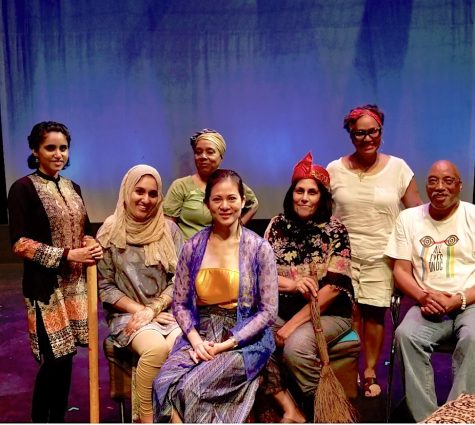
Cast Photo 2
Storytellers, from left, are Fatima Toor, Taiba Zahir, Judy Leak, Pimmie Juntranggur, Yildiz Yilmaz, Mimi Machado Luces and Barrington Salmon. Toor holds the Native American Talking Stick; an instrument of aboriginal democracy used by many Northwest coast tribes. It is passed around a group as a symbol of their authority and right to speak in public.
Wanda Whiteside believes immigration is what continues to make America great. Thus, the artistic director of Silver Spring’s Live Garra Theatre, is giving “new” Americans a platform for speaking their truths about their adopted homeland. The live show, “America’s Talking: A People’s Mosaic,” which will be filmed by the Silver Spring-based Gandhi Brigade Youth Media group, seeks to explore American identity as seen through not only recent comers to this country, but also via the musical and oral traditions whose ancestry now forms part of the American fabric.
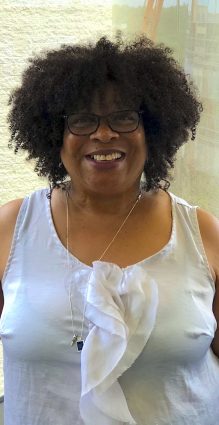
“It occurred to me that there were people who were asking what it means to be an American in this country. Is there a moment in their lives that made them feel that they connected?” Whiteside said of the project, which is being funded in part through a grant from Maryland Humanities. “I wanted to bring the local immigrant community together to tell their story. That’s what became ‘America’s Talking,’ where they engage in poetry and dramatic story telling so we can learn more about each other in this big, beautiful world we live in.”
What defines a person who resides between the Atlantic and Pacific oceans has developed and changed over the centuries, Whiteside said, with the original Native Americans having no concept of land ownership. “They kind of laughed when [settlers] came and wanted to buy Manhattan for $24,” Whiteside said of early contact with Europeans. “How do you ‘buy’ land? It doesn’t belong to anyone. We’re here to work with [the earth] and cohabitate with it.
“If anything, it belongs to our children,” she said, echoing an Indian belief.
“America’s Talking” will feature voices not only voices from the Native American community, but also of African-Americans and those who have come to the U.S. from Pakistan, Venezuela, the Middle East, Asia and the Americas. Cuban-American Reemberto Rodriguez, director of the Silver Spring Regional Center, also will be on hand to speak about his native island located just 90 miles from Florida. “He is sort of the unofficial mayor of Silver Spring,” Whiteside said of Rodriguez, whose story Gandhi Brigade members filmed as part of “America’s Talking.”
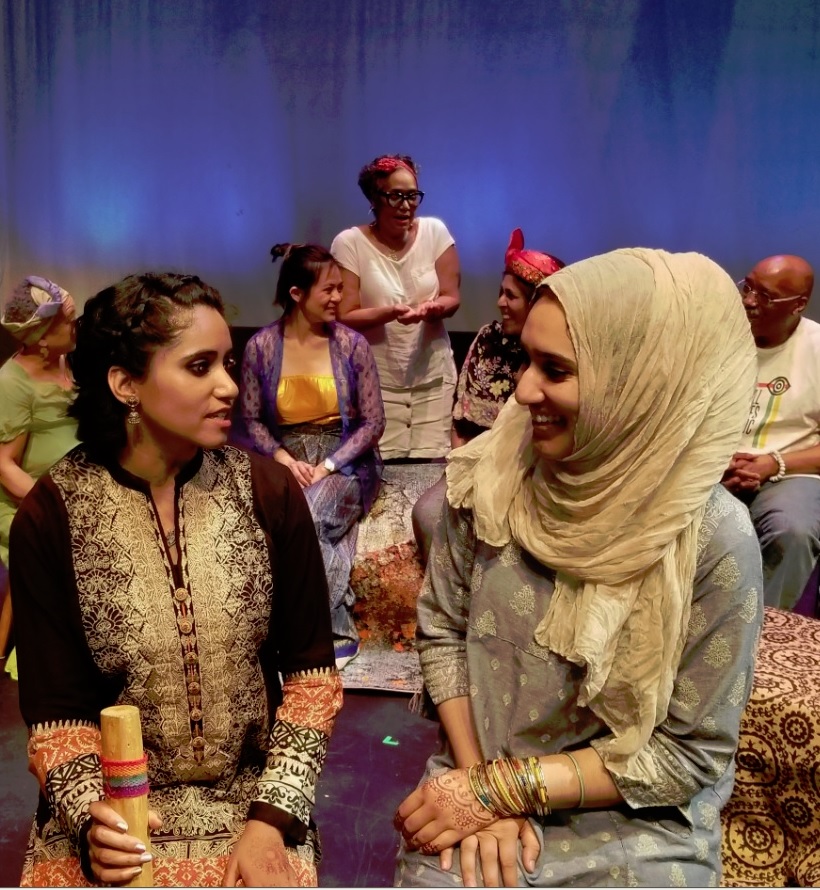
Whiteside said the genesis of “America’s Talking” came about when she was coaching a Caribbean-American actress who, although she had resided in the United States for several years, felt trapped between two cultures. “She felt she wasn’t quite ready to commit to being an American, always saying ‘I’m going back home,’” Whiteside recalled.
The events of 9/11 changed the Caribbean-American’s mind. “That’s when she knew that she was an American,” Whiteside said. “And it really hit me: there must be so many other immigrants in our community [who] realize that they really are part of this country even though they speak a different language or dress differently.”
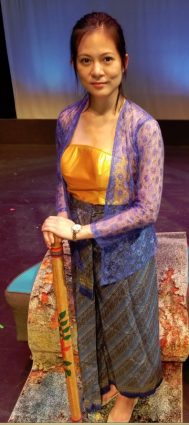
Other voices featured in “America’s Talking” include a Middle Eastern woman who, in the wake of 9/11, was harassed at her high school because of her heritage and wardrobe; a Venezuelan woman of Trinidadian heritage whose skin tones caused an “identity crisis” living in South America, and a Thai immigrant whose entry to the U.S. was only somewhat eased by interacting with Hawaii’s Asian-American community before continuing to the mainland.
“She couldn’t leave the country, and all of her family is in Thailand,” Whiteside said of the Thai émigré, who had to sit tight while awaiting her green card to be processed. “She couldn’t really participate in any of the American activities because she just felt [like] so much of an outsider.”
Whiteside said there always has been a nativist element in the U.S. when it comes to the newest wave of immigrants and that the current border backlash is perhaps little different than previous instances throughout our history. “It’s unfortunate because I believe it really is just a matter of fear of the unknown and what you don’t understand. That’s why that defense is there,” she observed. “So that’s part of the [exercise], why we all are sort of exposing ourselves and saying, ‘I don’t fear you; I’m not afraid to show you who I am. Please don’t fear me.’”
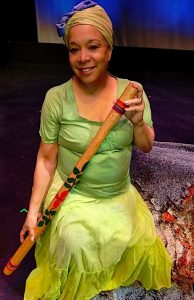
Whiteside, who plans to work on a project about jazz pioneer Buddy Bolden next, said that one benefit of her project might be to show people that Americans do not come in one color or creed. “I’m hoping people will realize that we are truly a human species. And you have to walk in the shoes of someone who may look different from you to understand that they are just like you,” she said. “See me as I see me. See me as I am!”
At the same time, she sees the U.S. as less of a melting pot and more a “stew,” wherein the ingredients of the population mix together yet remain themselves. “A stew has every flavor [making] it stronger. And that’s what is really the point of ‘America’s Talking.’ We are a mosaic,” Whiteside said. “We are a group of human beings who are part of this wonderful, wonderful human experiment.
“Hopefully, this little piece is like a pebble in the water, and the ripple will touch hearts and souls and minds, and maybe will touch one person and change them in some way,” she said. “I know that might sound a little sappy, but I truly believe it.”
Live Garra Theatre will present “America’s Talking: A People’s Mosaic” at 8 p.m. June 26 through 30, and at 3 p.m. June 30 and July 1 at the Silver Spring Black Box Theatre, 8641 Colesville Road, Silver Spring. For tickets, $20 (plus service fee), visit www.livegarratheatre.org. For information, call 855-575-4834.